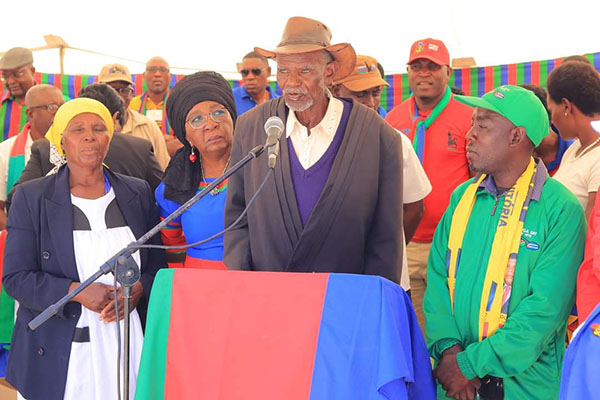Max Henrich Festus Hamalwa
ONGWEDIVA – Swapo war veterans yesterday remembered and commemorated Cassinga Day at the party’s regional headquarters in Okanjengedi, Oshana region.
Cassinga was a refugee camp in southern Angola which accommodated close to a thousand Namibian exiles comprising mainly children, pregnant women, disabled people and young boys and girls waiting to go to school.
On 4 May 1978, the South African Defence Force killed about 800 Namibian refugees at the camp. Many of the survivors were left with irreparable physical injuries as well as permanent mental and psychological
trauma.
To this day, the tragic event is presumed to be one of the worst war crimes in recent global history where 165 men, 294 women and 300 children died.
Swapo secretary general Sophia Shaningwa spoke during yesterday’s commemoration, and narrated how the South African troops killed and targeted innocent and defenceless Namibian civilians.
“The enemy brutally massacred in cold blood hundreds and hundreds of defenceless men, women and children of the Namibian soil. The innocent people targeted in the barbaric attack, most of them innocent civilians, had just fled Namibia because of racist South Africa’s illegal administration,” she recalled.
The Namibians sought refuge at the Cassinga camp and other settlements after unbearable conditions in their motherland.
“I am not a survivor of Cassinga, but I was a teenager in Ongwediva when Cassinga happened. Early in the morning around 07h00, all I heard and saw were military jets with a very high and unbearable speed racing towards Angola. Only late in the afternoon did we hear that our brothers and sisters in Angola were attacked by the military jets,” said Shaningwa.
She further explained how during the week of the Cassinga massacre, South African soldiers drove around with dead bodies tied to their military vehicles to intimidate Namibian people from crossing the border into Angola. “The dead bodies we saw gave us courage to leave the country, without the South Africans knowing. We left to go die like our fellow Namibian siblings who were tied to the military tanks. What a tragedy, what a history, what a painful story,” Shaningwa recalled.
“We hid under the dead bodies of our fellow Namibians. We had to act like we were dead so that the enemy could not kill us. Pregnant women were stabbed in the stomach so that the babies could die. Crippled individuals were not left alive; they were double-checked to make sure they were dead,” added Shaningwa.
Speaking on behalf of Cassinga’s surviving war veterans, Angelina Angula said yesterday marked exactly 45 years since the Cassinga massacre happened. “We saw aeroplanes in the air, and later heard tate Mbolondondo shout “take cover, take cover”, and people running. Most of them were crying due to the mass destruction the bombing was causing at the camp,’’ she recalled.
Angula then thanked the Cubans and Angolans for having intensively contributed to Namibia’s independence, although many lost their lives. She emphasised that the full support of the abovementioned countries is the reason why Namibia is free today, noting that the country’s history is incomplete without mentioning these friendly countries.
“Cuban comrades sacrificed their lives in Cassinga on that fateful day in order to save Namibian lives. We will likewise carry with gratitude what Angola has done for Namibia. Cassinga cannot be forgotten. As a Cassinga survivor, these ruminations are hounding us on a daily basis because those innocent comrades were brutally killed for the freedom and independence of our motherland. Together, we fought,” stated Angula.
The secretary general then thanked those who stayed behind in the country for their effortless support and for notifying them where the enemy was headed, what the enemy was doing, and where the enemy was hiding.
“The freedom and independence we enjoy today did not come on a silver platter. So, this day must always be remembered with respect and honour,” said Shaningwa
“Our war was not a joke. Our war is a story to be told. Our stories shall never be hidden under the carpet. We can only forgive, but we can never forget, hence shall the scars of our war remind us of what happened. We shall defend what belongs to our history because it was a sad day,” she continued.
Meanwhile, the Swapo secretary general appealed to Namibians to embrace the Cassinga Day commemoration as a day of remembrance for those who lost and sacrificed their lives. She said Cassinga cannot be forgotten, as the lifeless bodies of the Namibians were scattered everywhere in the camp, and were too numerous to be buried properly in formal graves.
Another Cassinga survivor, Esther Alugodhi, was in Cassinga when she was 17-years-old. She said this is the day when she witnessed her fellow Namibians being attacked by soldiers of South Africa’s apartheid regime.
Alugodhi observed that she still cannot cope with the trauma, even as she gets older. “It even looks like it happened yesterday. It was never easy for us in Angola,” she added.
Meanwhile, many survivors shed tears at the commemoration of Cassinga Day when they met with one another after a long period. Some survivors could not remember others. – fhamalwa@nepc.com.na, – maxhenrich356@gmail.com



